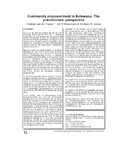| dc.contributor.author | Merwe, M. | |
| dc.contributor.author | Mberengwa, L. R. | |
| dc.contributor.author | Lekoko, R. N. | |
| dc.date.accessioned | 2011-02-16T14:02:27Z | |
| dc.date.available | 2011-02-16T14:02:27Z | |
| dc.date.issued | 2010 | |
| dc.identifier.citation | Merwe, M., Mberengwa, L. R. & Lekoko, R. N. (2010) Community empowerment in Botswana: the practitioners' perspective, Journal of Family Ecology and Consumer Sciences, Vol. 38 | en_US |
| dc.identifier.issn | 0378-5254 | |
| dc.identifier.uri | http://hdl.handle.net/10311/687 | |
| dc.description.abstract | The term empowerment has become a buzz word used by development organisations and government sectors to make development programmes sound technically correct. These programmes are often the cause of the poor becoming disillusioned and passive, since these programmes often do not achieve what they have set out to achieve. One such group that is responsible for the empowerment of community members in poverty and other special circumstances, is the home economics extension officers (HEEOs) in Botswana. This article focuses on the HEEOs’ understanding of the term empowerment as well as the subsequent actions they are taking to bring about empowerment and the hindrances that impede their empowerment practices. Qualitative data gathering methods in the form of open-ended questionnaires and semi-structured interviews were carried out with HEEOs to understand the phenomenon of empowerment. A focus group discussion was in addition conducted with one community sewing group. It became evident that HEEOs linked the term empowerment mostly to training and education. This is contrary to literature, which describes training and education as only the beginning of the empowerment process. Empowerment will however only take place if individuals are encouraged to define their own goals and to act upon them. HEEOs included community members in planning, implementation and evaluation of development programmes, but there is no evidence of authentic involvement. Community groups were also not adequately mentored and supported by HEEOs. In addition, the system within which empowerment practices are carried out appeared to be not conducive to supporting HEEOs in their empowerment practices. | en_US |
| dc.language.iso | en | en_US |
| dc.publisher | South African Association of Family Ecology and Consumer Sciences (SAAFECS). http://ajol.info/index.php/jfecs/index | en_US |
| dc.subject | Empowerment definitions | en_US |
| dc.subject | Empowerment strategies | en_US |
| dc.subject | Home economics extension | en_US |
| dc.subject | Community development | en_US |
| dc.title | Community empowerment in Botswana: the practitioners' perspective | en_US |
| dc.type | Published Article | en_US |

